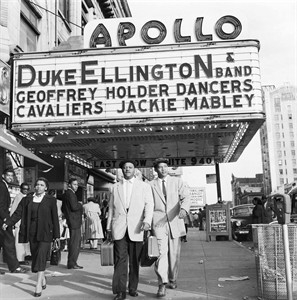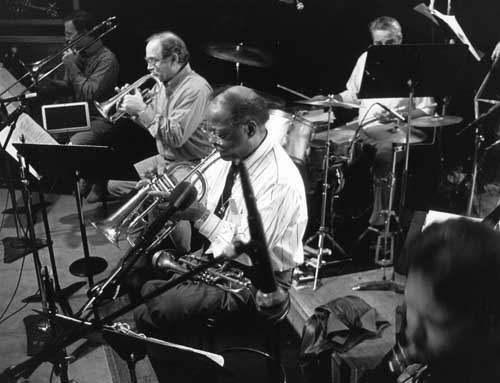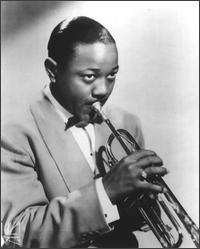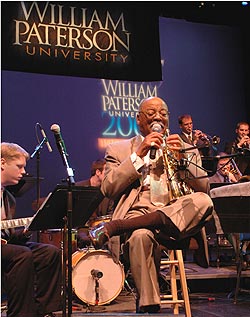To quote Duke Ellington, Clark Terry's playing style is “simply beyond category.” An alum of both the Basie and Ellington orchestras, Clark Terry is now a legend on trumpet and flugelhorn, and widely recognized as 'the father of jazz education.' One of the first young music students Clark mentored was Quincy Jones.
As a kid Clark had such passion for music he fashioned an instrument out of a pipe and a piece of garden hose. The sound was so bad that neighbors pitched in $12.50 and bought him a horn from a pawn shop. Obviously, it was a very good investment.
Clark Terry says that though he never studied music formally, he was well- educated in the literature of the big bands. “I attended the 'University of Ellingtonia.' And of course, Basie was the prep school in order to graduate into the Ellington school. Ellington was far more knowledgeable as far as theory and counterpoint was concerned, but Basie had that knowledge about time, tempo, swinging and simplicity.” Clark Terry belongs to a generation of artists who brought a new level of mastery and perfection to jazz performance in the post-WWII years.

Clark Terry, second from right, after his first stage show with Ellington‘s band in Harlem, 1955. Photo courtesy Harlem World.
Clark has devoted considerable time and effort to passing on his knowledge to succeeding generations of musicians. He recently donated his archive of memorabilia to William Paterson College in New Jersey, one venue where he is an adjunct professor. And he still takes time to teach children in his home.
A pioneer in introducing the flugelhorn to jazz, Clark is the first master of the instrument, which plays the same notes as the trumpet but is internally shaped more like a French horn. Thus, it produces a mellow, haunting sound. Using a golf analogy, Clark compares the trumpet to a driver and the flugelhorn to a putter. Today modern-style jazz trumpeters often use a flugelhorn because of Clark Terry. He has been a pioneer in other ways as well. In the 1950s Clark was the first African-American to be hired as a network TV staff musician. And he helped break down racial barriers in Broadway pit orchestras.
Famous for his 'Mumbles' routine—a spoof on the blues bars of his hometown St. Louis—Clark developed a large following in the 1960s, performing in the NBC Orchestra on the Tonight Show with Johnny Carson. Growing up in St. Louis in the 1920s and 30s, Clark was influenced by Fate Marable and New Orleans trumpeters lured to St. Louis, while working the Streckfus riverboat line.
This week on Riverwalk Jazz we hear from Clark Terry on the occasion of his 90th birthday. And we listen to tracks from his repertoire with the Basie and Ellington orchestras, recorded live at The Landing with The Jim Cullum Jazz Band in the 1990s.
Former Cullum Band bassist Don Mopsick recalls his first Riverwalk Jazz rehearsal with Clark in San Antonio. “At the start of the rehearsal we were all standing in a circle, and I was directly opposite Clark with the bell of his flugelhorn pointing straight at me. We began rehearsing the chart on “Come Sunday.” Before I joined the Cullum Band, I was already well familiar with Clark’s playing on records and had even played a few jam session gigs with him in Florida. But nothing prepared me for that huge, warm, soulful sound pouring out of that horn that day. It went right through me.”

L-R Mike Pittsley-trombone, Jim Cullum-cornet, Eddie Torres-drums, Clark Terry-trumpet/flugelhorn and Allan Vache-clarinet, 1991. Photo courtesy Riverwalk Jazz.
Jim Cullum says of jazz master Clark Terry:
"Jazz trumpeter Clark Terry is now 90 years old and he is still going strong. These days Clark is routinely wheeled onto stage and is afflicted with a variety of ailments, but when he gets that trumpet in his hands he is off and running with displays of on-the-spot creativity and virtuosity that mark the master jazz player. His sound and style are instantly recognizable.
I have had the good fortune to appear with Clark both at festivals and on several Riverwalk radio broadcasts. In addition to his immaculate playing, Clark is a wellspring of matchless and seemingly endless accounts of the 'old days' when he was a key member of both the Count Basie and Duke Ellington orchestras. The stories are rich with energy and enthusiasm, clearly displaying his love for the music and the life that goes with it—the musicians, the history, the audiences and his students."
Listeners to Riverwalk Jazz this week will be treated to Clark Terry's great sense of humor, the poignancy of his storytelling and his masterful playing.
Photo credit for Home Page: Clark Terry Photo courtesy Academy of Achievement.
Text based on Riverwalk Jazz script by Margaret Moos Pick ©2008



